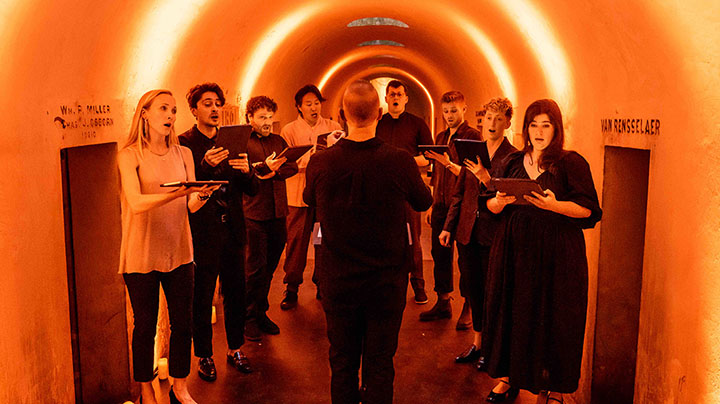Andrew Ousley is the creative impresario behind the classical music concerts performed in crypts and catacombs in Green-Wood cemetery. On Thursday September 5th, wearing a Damien Hirst-esque sequined skull pinned to his shirt, he presided over an evening of cocktails and choral singing, which concluded in Fourth Wall Ensemble’s hauntingly good selection from Caroline Shaw’s Partita for 8 Voices.
Ousley’s major innovation is straightforward: he wants to let people enjoy things. Even audiences at chamber music concerts can have a little bit of pleasure, just as a treat. He makes the bold move of assuming that high culture requires a context, a vibe, a little zhuzh to hold our interest.
My evening with Death of Classical began on the outskirts of Green-Wood Cemetery, where we gathered to sip thimblefuls of whiskey, tequila, gin, and mescal. The reception space had all the charm of a suburban funeral parlor, but I suppose that is what you get when you booze legally in cemeteries. The last time I’d gotten drunk in a cemetery was drinking blue curaçao at the grave of J.K. Huysmans in Montparnasse at the age of 22. We got thrown out.
After the reception, as Ousley, wearing his disco skull, guided us through the tombstones to the catacombs, I attempted to calculate, alongside my companion for the evening, how many thimblefuls of booze made up one drink. This turned out to be a fruitless exercise. We had both lost count.
The concert took place in the catacombs, which are located in the center of the cemetery, a long and spooky walk from the reception area. Inside, chairs were arranged along a narrow stone corridor lined with crypts. A stage was set up in the corridor, but Fourth Wall Ensemble started singing their Improvisations on Medieval Chant at the far back wall, a long way from the audience. This distance created an echoing and uncanny resonance that wrenched me out of my head and momentarily out of the modern world. Their improvisations, combined with rhythmic choreography, created a thunderous Sacred Harp-like sound. Death of Classical productions are very good at opening up psychic spaces like this. In a time when so many have forgotten how to listen or how to simply be in an audience, steps taken to engage audiences in novel ways seem not just charming but completely necessary.
Fourth Wall’s sound is jewel toned and sumptuous. Their expressive, emotive, embodied singing, their sheer exuberance, was a joy to behold. Rarely have I seen singers sing so well while appearing so happy. Happiness is usually the arena of amateur choirs. Professional singers, even in intimate chamber performances, often switch into concert mode, the light disappearing from their eyes as they think eight measures ahead. Fourth Wall, however, maintains its richness and near musical perfection while remaining engaged and present.
The program continued on from medieval improvisations to a Renaissance and Baroque interlude with William Byrd’s “Mass for Four Voices – Agnus Dei,” and Monteverdi’s “Lagrime D’amante Al Sepolcro Dell’amata,” (Tears of a lover at the tomb of his beloved). Each voice in Fourth Wall was held and curated so beautifully that while I am no great lover of madrigals (at least not so many in a row), the theatrical strangeness of the evening never dissipated.
The sections of Caroline Shaw’s Partita are each named after a baroque dance. Fourth Wall Ensemble performed three of Shaw’s four sections: Allemande, Sarabande, and the fourth section, Passacaglia. The singers traipsed winningly through Shaw’s varied and complex score. Their individuated and embodied voices seemed made to sing Partita. Hearing the bass drone in the catacombs sent literal shivers down my spine. The layered spoken word sections gave me the sensation of emerging from a pool and hearing the sounds of dry land become suddenly audible as my ears empty of water. After the last note had sounded, the catacombs filled with the sound of crickets from the cemetery. Fourth Wall had made the silence come alive. It was as though they had released us from an enchantment and we all woke up giggling and surprisingly well rested. This most joyful of vocal ensembles performing one of the happiest pieces of new music of the 21st century was delightful. I wished the performance had been longer.
Death of Classical productions rarely miss; however, the maximalist in me always wants more from them: more theatre, more movement, more visual stimulation, more everything. I would love to see what Death of Classical could do with a serious budget. However, arts funding being what it is, I’d be satisfied with just a bit more of a meaningful core to these performances. They are splendid aesthetic occasions that, given the artistic instincts and extraordinary musicianship on display, are too easily swept into oblivion. Ousley’s talent for turning high culture into enticing delicacies is much needed in a world with shrinking audiences for classical music. Giving these evenings a narrative center or a richness of meaning could take them over the edge, out of the abyss of abstraction.
Photo: Steve Pisano



